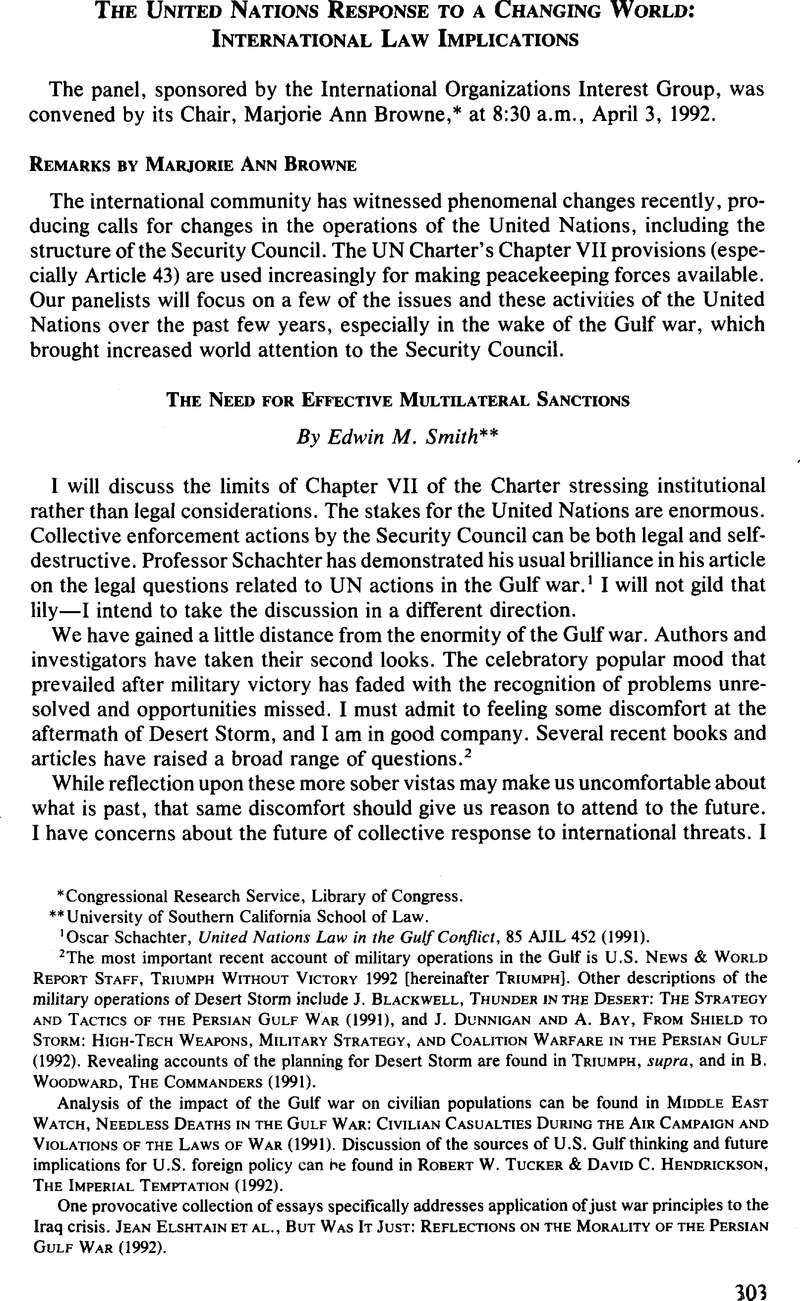No CrossRef data available.
Published online by Cambridge University Press: 28 February 2017

1 Oscar Schachter, United Nations Law in the Gulf Conflict, 85 AJIL 452 (1991).
2 The most important recent account of military operations in the Gulf is U.S. News & World Report Staff, Triumph Without Victory 1992 [hereinafter TRIUMPH]. Other descriptions of the military operations of Desert Storm include J. Blackwell, Thunder in the Desert: The Strategy and Tactics Of the Persian Gulf War (1991), and J. Dunnigan and A. Bay, From Shield to Storm: High-Tech Weapons, Military Strategy, and Coalition Warfare in the Persian Gulf (1992). Revealing accounts of the planning for Desert Storm are found in Triumph, supra, and in B. Woodward, The Commanders (1991).
Analysis of the impact of the Gulf war on civilian populations can be found in Middle East Watch, Needless Deaths in the Gulf War: Civilian Casualties During the Air Campaign and Violations of the Laws of War (1991). Discussion of the sources of U.S. Gulf thinking and future implications for U.S. foreign policy can he found in Robert W. Tucker & David C. Hendrickson, The Imperial Temptation (1992).
One provocative collection of essays specifically addresses application of just war principles to the Iraq crisis. Jean Elshtain ET AL., But Was it Just: Reflections on the Morality of the Persian Gulf War (1992).
3 Security Council Summit Declaration, New Risks for Stability and Security, N.Y. TIMES, February 1, 1992, at A4.
4 These arguments were usually based on UN Charter art. 2(7).
5 SC Res. 678 (November 29, 1990), reprinted in 29 ILM 1565 (1990).
6 See Schachter, supra note 1, at 462-63.
7 See Woodward, supra note 2, at 34-42.
8 Triumph, supra note 2, at 414-15. The authors assert that during late October, 1990, the Bush Administration concluded that force provided the only option if diplomacy failed. Id. at 171-72. See also R. Tucker and D. Hendrickson, supra note 2, at 41-42.
9 Id. at 181-82, 198-99.
10 Kenneth R. Timmerman, The Death Lobby: How The West Armed Iraq (1991).
11 See Robert A. Hilderbrand, Dumbarton Oaks: The Origins of the United Nations and the Search for Postwar Security (1990); Inis Claude, The Management of Power in the Changing United Nations, reprinted in Richard Falk ET AL., The United Nations and a Just World Order 143-52 (1991); M. Finkelstein and Lawence Finkelstein, The Future and Collective Security: An Essay, M. Finkelstein and Lawrence Finkelstein, Collective Security 255-73 (1966).
12 See Claude, supra note 11, at 146-50. For a description of the post-Cold War context that proceeds from balance of power assumptions, see Henry Kissinger, What Kind of New World Order? WASH. POST, December 3, 1991, at A21.
13 See Lucia Mouat, Prestige High, UN Looks Stronger, Christian Sci. Monitor, March 11, 1991, at 4; Josh Friedman, UN United, Divided by U.S. New Role, Newsday, July 29, 1991, at 21.
14 Thomas Franck has sharpened our appreciation of the importance of legitimacy. See Thomas M. FRANCK, The Power of Legitimacy Among Nations (1990).
15 Unless the United States recognizes the difficulty of claiming its actions to be legitimate, it risks reactivating a pure balance-of-power system with itself as the power to be resisted by a broad coalition. Since military power faces ever-declining utility in today’s world, U.S. ability to accomplish its goals by acting in isolation may be diminishing. See R. TUCKER & D. HENDRICKSON, supra note 2, at 14-17. Unfortunately, the costs of failed unilateral endeavors will be paid in human lives.
16 J. Dunnigan and A. Bay, supra note 2, at 179-80; Triumph, supra note 2, at 409-10.
17 Triumph, supra note 2, at 410.
18 See Middle East Watch, supra note 2, at 149-93; Triumph, supra note 2, at 409-410. See also Staffer Who Released Iraq War Toll to be Dismissed, CHI. TRIB., March 8, 1992, at C4.
19 Estimates of Iraqi military deaths have fallen from over 100,000 to a range of 10,000-20,000. TRIUMPH, supra note 2, at 403-09; Tactical Bombing of Iraqi Forces Outstripped Value of Strategic Hits, Analyst Contends, Aviation WK. & Space Tech., Jan. 27, 1992, at 62; Patrick Cockburn, Lower Death Toll Helped Sadaam, The Independent, Feb. 5, 1992, at 11.
20 Strobe Talbott, Post Victory Blues, 71 Foreign Aff. 53 (1992).
21 SC Res. 687 (April 3, 1991), reprinted in 30 ILM 846 (1991).
22 SC Res. 661 (August 6, 1990), reprinted in 29 ILM 1325 (1990).
23 Remarks to the United Nations Security Council in New York City, 28 Weekly Comp. Pres. Doc. 184 (January 31, 1992).
24 London Economic Summit Political Declaration: Strengthening the International Order, 27 Weekly Comp. Pres. Doc. 963 ¶3 (July 16, 1991).